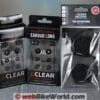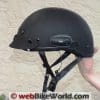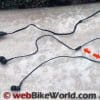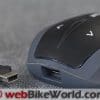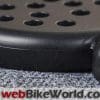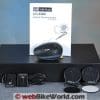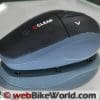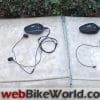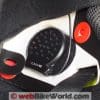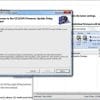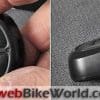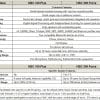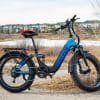UClear has introduced the UClear Pro headset and Universal Earbud kits for the HBC100 Plus and HBC200 intercoms.
These are designed for use with half-helmets, 3/4 helmets and/or flip-up, modular or full face helmets.
They include the patented UClear boomless “Microphone Array Technology”.
And the systems add a whole lot more versatility, flexibility and performance capability in small well-priced (<$30.00) packages.
This means that no matter what type of helmet or head covering you might wear or no matter the time of year or activity, UClear now has a form-factor component that will work.
Along with all the latest goodies, UClear has released firmware updates that have resolved the various issues we reported on in previous reviews.
Also, additional new features and performance enhancements and ongoing support (thanks in large part to a U.S. based product manager) guarantees an even better return on the investment.
Bluetooth helmet systems are getting better — seemingly by the day — and some exciting new capabilities are coming to market.
But despite all the competition, UClear remains the “clear” winner in overall audio performance category for motorcycle Bluetooth communication systems.
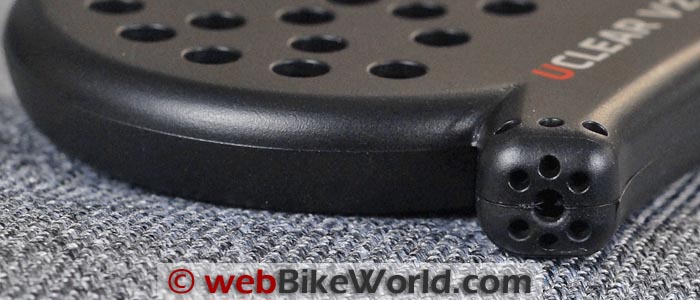
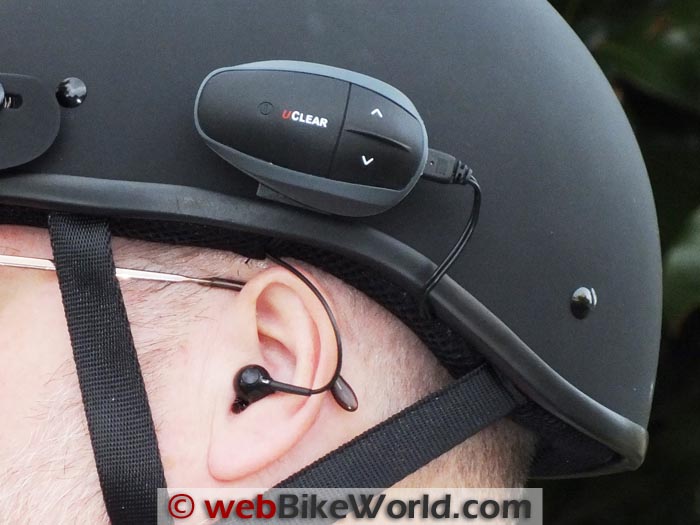
UClear “Boomless” Microphone System in a Nutshell
Just as a reminder to anyone new to the world of UClear intercoms (I suggest you read the original HBC 200 review for more background on the technology), these systems do not use a boom-type mic.
Instead, they use a patented “Adaptive Beam Forming” technology (now apparently called “Microphone Array Technology” by UClear), which was adapted by UClear from the military communications systems they also manufacture.
This means that the microphones in a UClear intercom system are built in to the speakers (photos above) and there is no boom microphone like there is in other intercom systems.
The new UClear Pro Microphone and Universal Earbud systems also have tiny Adaptive Beam Forming microphones.
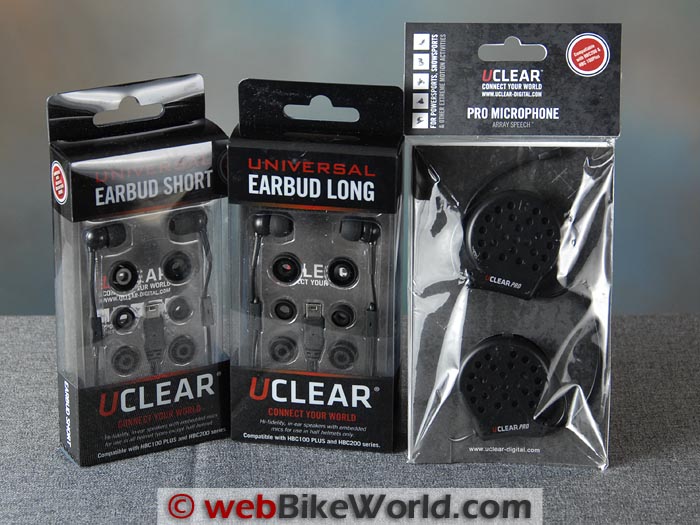
Background
An email dispatch from the Editor, who had made the trek down to the inaugural AIMExpo in Orlando Florida this fall, brought lots of news.
That included the fact that UClear had released three new products: a Pro Microphone headset and two earbud-based headsets, each unique in their own way.
The release of these three products answer a lot of questions that webBikeWorld readers have regarding which Bluetooth intercom systems could be used on or adapted to a variety of helmet types.
Earlier variants of the original HBC100 intercom provided options to secure or carry the module on or in clothing.
But the basic problem remained: what to do with the speakers with their unique UClear built-in “Beam Array” microphone.
So in a move that could be classed as “finally”, UClear now offers two earbud kits: one for full face, flip or three-quarter style helmets and another geared specifically for shorty style helmets or other similar headgear, protective or otherwise.
The third new product could be classed as evolutionary because it is based on the current UClear V2 headset (which is claimed to provide a 15-20% performance increase over the other headsets).
But the new UClear “Pro” headset sports its audio pickups or microphones at the end of short extender leads.
This allows optimal placement of the microphones in helmets that for many reasons don’t seem to be good hosts for many headsets, UClear or otherwise.
Along with a review of these three new products, it was also time to provide an update on the current HBC100 Plus and HBC200 Force systems.
I have been using both of those for some time, particularly as the systems on hand have suffered many of the symptoms experienced by other users, all well documented from emails, feedback from webBikeWorld readers and comments culled from various forums.
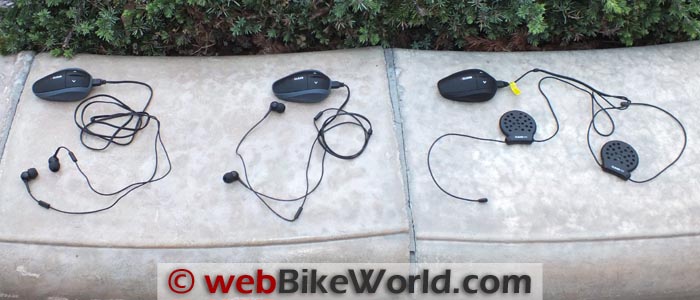
UClear HBC100 Plus/200 Series Pro Microphone Kit
Tthe new UClear “Pro” microphone kit is compatible with both the HBC100 Plus and HBC200 series intercoms.
They’re based on the UClear V2 headset, which is the standard speaker with built-in “Adaptive Beam Forming” microphone system provided with the HBC intercoms,
This provides yet another twist on UClear’s objective to provide the best system audio possible.
With the microphones on the Pro series now located on the end of extender leads, the voice pickup area can be custom-tailored to address issues found in some helmet types.
The issues can includes helmet shape, complexities with the inner foam shell and padding, liners or other problems that may interfere with optimal performance of the standard UClear integrated speaker/microphone components.
Because the Pro microphones are separate from the speakers, they can be positioned elsewhere in the helmet (brow, forward edge or chin-bar areas).
And the microphone performance is maintained, especially in half-helmets or other types.
Although primarily designed for the half-helmets favored by cruiser owners, the UClear Pro microphone kit can also replace the standard UClear speaker/mic system to work with virtually any motorcycle helmet type.
That includes those with unique shapes or specialized interiors for other outdoor sports (powered or otherwise) activities.
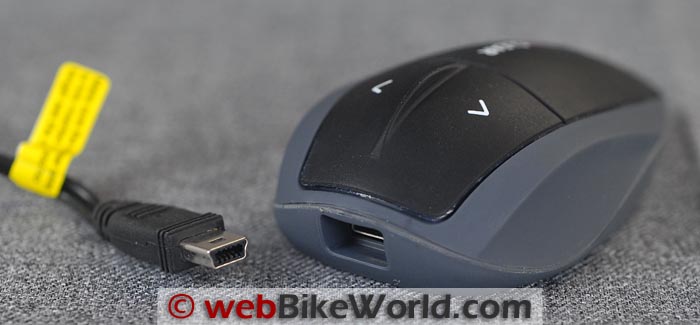
Installing the UClear Pro Series Speaker/Microphones
No longer possessing a particular helmet used for cold weather sled use, I had to be content with putting the Pro microphone kit into the SCHUBERTH C3 (review).
That helmet is a good candidate due to its tight-fitting, thickly padded cheek pieces.
The C3 also has an advantage that it has a very good adjustable accommodation for intercom speakers.
I removed the standard UClear V2 speakers from the HBC100 Plus intercom and installed only the speaker modules of the Pro kit mounted in exactly the same spot on each side of the helmet.
With the C3 liners un-snapped and pushed back out of the way, the Pro kit microphone leads were run forward to the front upper portion of the helmet.
Using the instructions printed on the simple Pro microphone packaging, the microphones were placed 140 mm (5.50 inches) apart from the centre of the helmet and 5 mm up from the lower front edge of the shell.
I held these in place with some clear tape for initial positioning.
Two of the four hook-and-loop tabs included in the kit were placed higher on the front edge of the inside shell so that when each microphone lead is positioned between the two halves of each tab, the microphones would be held in the correct position.
This is a critical requirement with the standard UClear headsets for optimal audio pickup and creation of the Adaptive Beam Forming technology “sweet spot” in front of the rider’s mouth, to pick up the sound.
With this done, it was a simple matter to lay out and snap the liner pieces back into place and then mount the HBC100 Plus and HBC200 Force modules in place for some initial tests.
So whether the microphone leads are placed above, below or forward on sidebar/chin-bar sections, the important thing is to maintain the optimal spacing and linearity to the degree possible so the microphone array approach is maintained.
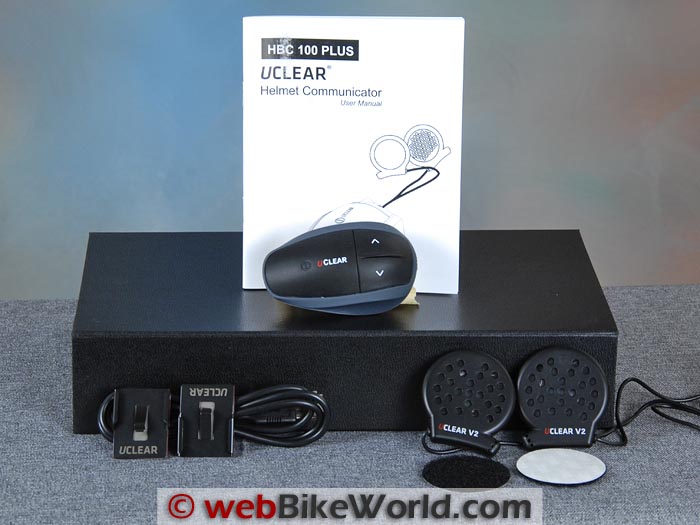
UClear Pro Microphone System Performance
Although I was a bit dubious of what the results might be, running the Pro microphone headset in the SCHUBERTH C3 didn’t raise any issues.
Audio from the UClear speakers is just superb — the speakers included in both the standard UClear V2 headset have no degradation in intercom audio whatsoever.
Admittedly, no matter if mounted somewhat to the side or above the brow, the Pro microphones are out of the front helmet area, which can be a noisy or disruptive environment for many headsets.
Extended riding opportunities reveal little change in system intercom performance.
However, I noticed that in helmets with a full or partial face-shield, changing the position of the shield resulted in some minor performance impact.
This happened whether the extensions for the microphones were positioned up inside the shell as recommended or — as done for a test — placed on the “brow” or front lip of the helmet liner.
Positioning the extension microphones on the brow of the helmet liner resulted in the best audio pick-up.
But this more exposed placement also resulted in higher noise levels, most of which was filtered by the digital processing, so overall audio remained good.
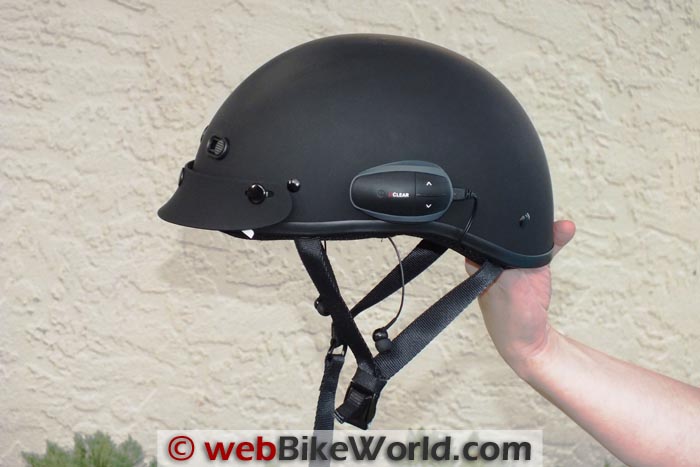
UClear Universal Earbud Short
The new UClear Universal Earbuds come in short (UEA-S) and long (UEA-L) versions.
The lengths refer to the length of the microphone, which is placed on a length of wire separate from the speakers.
Designed for full face, modular and three-quarter style helmets, the set has a cord length of 120 cm (47 inches) with small in-line audio pickups (microphones) located 4 cm (1.5 inches) from the earbud modules.
Installation is simply a matter of test-fitting the earbud set so as to get the best sized inserts in place for sound-dampening fitment and comfort.
And as long as the necessary clearances are available between the helmet and head, there shouldn’t be any issues.
Like other earbuds on the market, the UClear Universal Earbuds have the specifications and performance to really impress and believe me, they do.
Bass, mid- and high-tones are all there; just remember to use common sense regarding output/volume settings. For those who do use earbuds, full time or just for a change between helmets, this kit is well worth a try.
Note that the use of earbuds while riding may be illegal in some localities, so check on this before you buy.
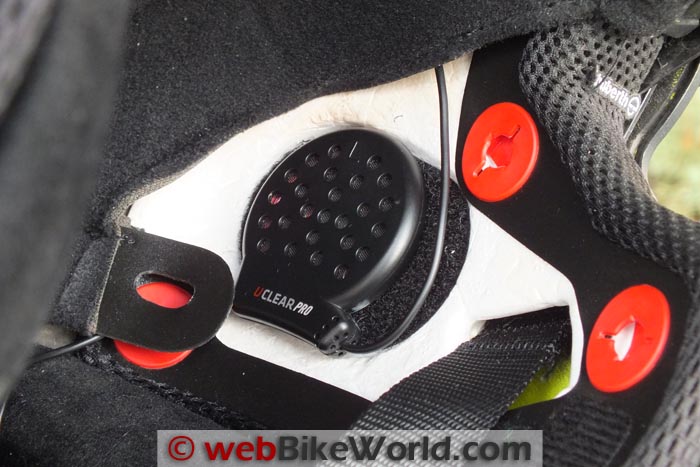
UClear Universal Earbuds Long
Intended specifically for half-helmet use but adaptable for caps or loose-fitting head coverings of some type, this headset has a cord length of 80 cm (21 inches), with the in-line audio pickup units located 20 cm (8 inches) from the earbud modules.
The extender microphones are mounted in similar manner as for the UClear Pro headset.
Installation in a ZOX half-helmet, used for the Sena SPH10H review, became the candidate for the UEA-L Universal Earbud Long kit.
After viewing the brief instruction sheet and watching the UClear Universal Earbud installation video (YouTube), it didn’t take long to get the headset installed — just two small slits cut in the helmet liner at the midpoint above the ear.
These small access points allow the earbud pieces to be run out and dropped down on the right and left sides with the extender microphones mounted as for the Pro kit in the SCHUBERTH C3.
Just be sure to adhere to the instruction clearances and all will be good.
Outside of using two hook-and-loop tabs for the microphone positioning, a few short thin strips of Gorilla tape got all the other leads securely held in place to the hard liner (cloth-based medical tape works equally well).
Ten minutes of effort had the installation completed.
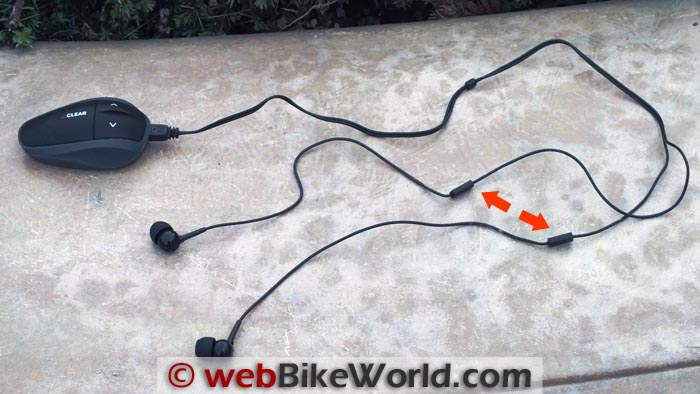
Universal Earbud Performance
Both earbud kits share the same specs: 9 mm diameter driver, frequency response of 15Hz to 22KHz, sensitivity of 95 dB (±5 dB) and impedance of 32 Ohms.
Output is extremely good, further enhanced by the pure audio output provided by the UClear systems themselves.
As with the SCHUBERTH C3 Pro (preview) microphone kit, intercom use didn’t bring about any surprises and little, if any change, is noted in performance.
Now, I haven’t yet done high speed road tests on a partially or un-faired motorcycle, but if UClear has done their homework this type of installation will provide a very viable option for half helmet users.
UClear Firmware Update Report
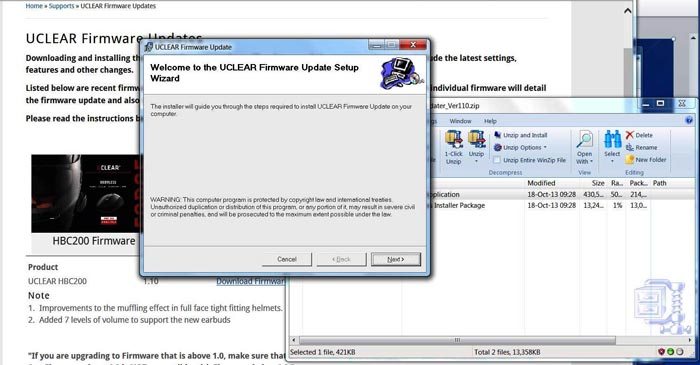

HBC 100 Plus Performance Updates
As noted earlier, one of the best system enhancements provided with the latest version of the UClear HBC100 intercom, which is called the HBC100 Plus, are the V2 headsets.
These are a big audio step forward compared to the original speakers and easily the equal or better of the HBC200 headsets, in my opinion.
HBC100 Plus Firmware Updates
UClear has responded to webBikeWorld reader feedback with the latest firmware updates, now available on the UClear website.
The firmware v1.10 update provides improvements to the “muffling” effect reported by some owners in full-face, tight-fitting helmets.
And the update adjusts the volume setting levels to better support the new UClear Universal Earbud components.
Firmware v1.12 is the latest release, which introduces a 4-party intercom function (scooped by the Editor while at AIMExpo), along with some other subtle tweaks.
This is a free upgrade, available as a download (with registration) and once it’s installed, it provides an excellent capability for group activities.
Four systems, all running the latest firmware, can be paired (detailed as part of the upgrade instructions).
This yields a nominal range of up to 0.5 kilometers (1/3 mile) between two paired UClear intercom systems.
And when daisy-chained with the UClear Multi-Hop capability, a range of up to 1.9 km (1.2 miles) is viable with four paired UClear intercoms (lesser distances, of course, with fewer paired intercoms) can be had.
HBC 200 Performance Updates
While issues with the HBC100 Plus intercoms seem sporadic, the HBC200 intercoms I have on hand were just plain cranky and they seemed to deteriorate on a regular basis even after system resets and more drastically, re-flashing the firmware.
HBC200 Firmware Version 1.07 Update
Released in August of 2013, this release was in response to the issues raised by webBikeWorld readers and me, but it wasn’t well advertised, another fact working against the support team.
At about the same time (coincidence?) a replacement set of HBC200 intercoms running the latest v1.07 release were sent to the Editor, who forwarded them on up to me.
To say this firmware update did the trick would be an understatement; it resolved virtually all the issues being reported, with many owners being quick to validate the effectiveness of the update.
Pairing two devices and switching did indeed become seamless and very fast overall. Since being updated, both HBC200 intercom systems have been working exceptionally well.
I’ve even managed to get my older (semi-smart) work cell phone and the smarter iPhone 4S paired up and working — this is good.



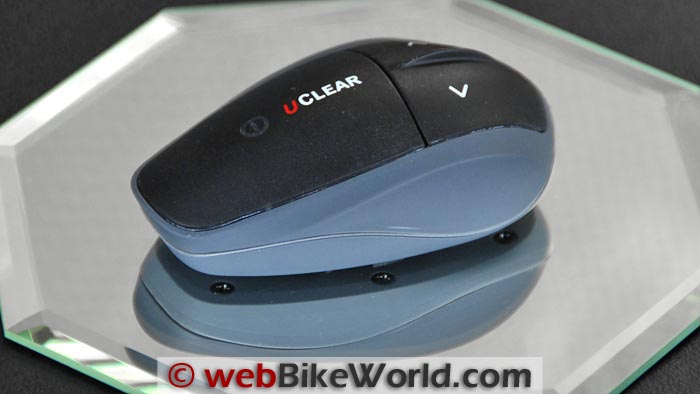


Bluetooth Adapters, Earbuds, Radios and More
During sustained use in very heavy rain this summer, both of my HBC200 intercoms allowed a bit of moisture to seep inside the housing.
This is typically around the frontal area and along the top upper edge, causing one of the systems to function in a sporadic manner.
Opening up both intercom modules revealed the moisture inside — more so on the one that had been misbehaving.
I blotted the moisture off the circuit board and then let them dry out for a day before reassembling the cases.
Once back together and fully charged, they both checked out just fine and were put back into daily use.
UClear said this was the first instance reported and indeed it does seem to have been an isolated occurrence as the moisture seepage has not happened since even when riding in similar conditions on un-faired motorcycles.
Differences Between the UClear HBC100 and HBC200 Intercom Systems
Here’s a basic chart I created to illustrate the commonalities and differences in the two current UClear intercom systems.
The HBC 200 “Force” intercom system was the “next generation” design that was followed shortly thereafter with the release of the HBC 100 Plus.
The two intercom systems are visually identical, less some minor housing and colouration differences. The real differences are feature and performance related, which is summarized in the following table:
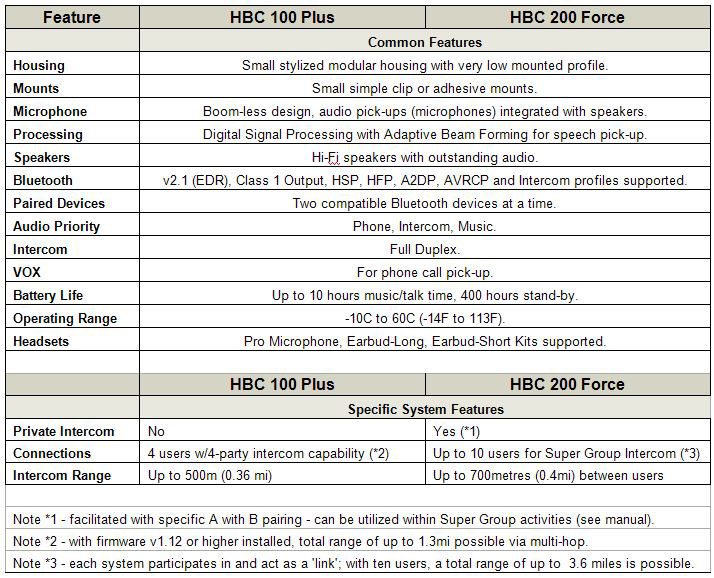

Conclusion
It can be said that UClear has been through some ups and downs over the past year or so.
But in response they have continued to improve and evolve the systems and introduce new and very worthwhile accessories.
Another big positive is a ramped-up support effort with a North American-based Product Manager.
All three new UClear products are simple in design and intent and very effective overall, providing many more options for current and potential users of the UClear intercom systems.
So where does UClear go from here? Well, hopefully a continuation of the product line refinement, which has so far provided feature, function and performance dividends.
Bluetooth motorcycle helmet intercom systems are evolving rapidly, with new products introduced monthly it seems…2014 could be a banner year and I suspect UClear will be in the thick of it.
| wBW Review: UClear Pro Microphone and Universal Earbuds | |
|---|---|
| Available From: UClear Digital (BITwave) | List Price: Pro Microphone: $29.99. Universal Earbuds: $59.99. |
| Review Date: January 2014 | Made In: Unknown |
Note: Item provided by a retailer, distributor or manufacturer with these Terms and Conditions.
Owner Comments and Feedback
See details on submitting comments.


